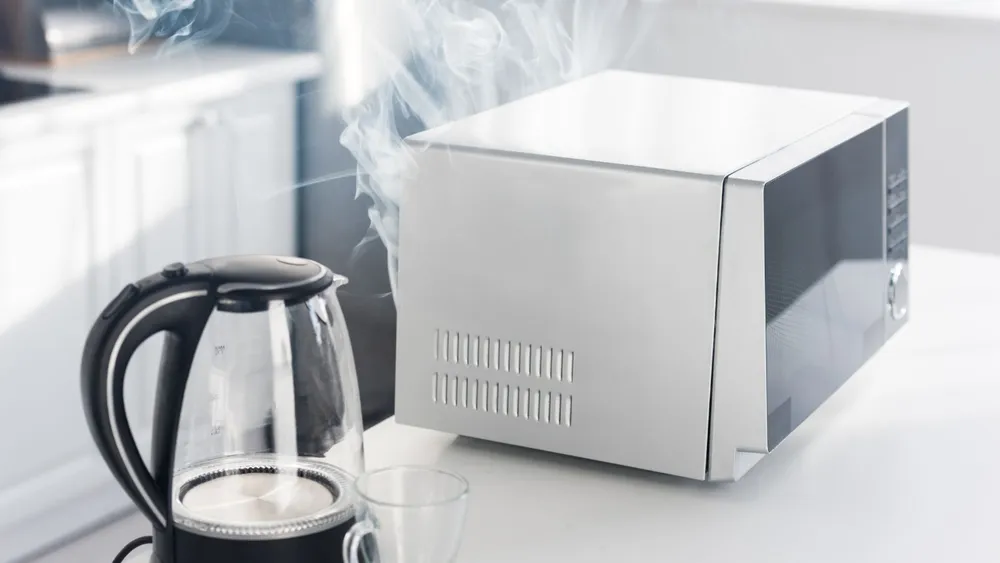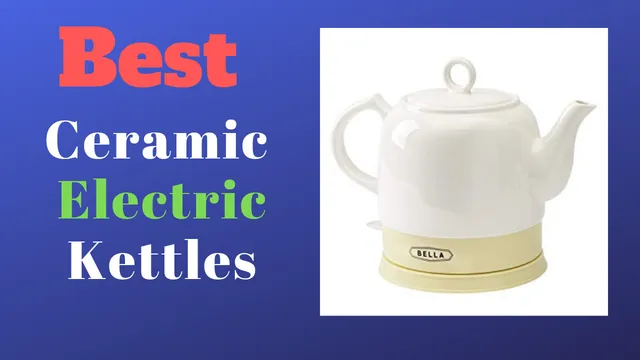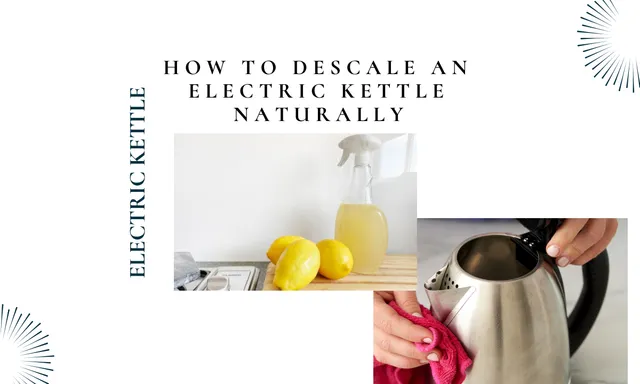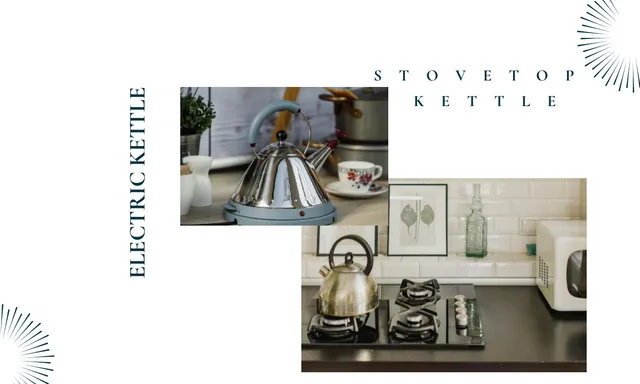Electric Kettle vs Microwave: Which is Best for Boiling Water?
-
 Dragos
Dragos - January 14, 2024

The quest for the perfect cup of tea or coffee often begins with a simple task: boiling water. In today’s fast-paced world, convenience is key, and both electric kettles and microwaves offer quick solutions. But which is truly the best option for your needs?
Electric kettles have revolutionized our kitchens, offering speed and efficiency. Microwaves, on the other hand, are versatile appliances found in most homes. This comparison will help you make an informed decision based on various factors including efficiency, safety, and overall usefulness.
The Science Behind Boiling Water
Before diving into the comparison, it’s essential to understand what happens when water boils:
- Water boils at 100°C (212°F) at sea level.
- Boiling occurs when the vapor pressure of the liquid equals the atmospheric pressure.
- In microwaves, water molecules are agitated by electromagnetic waves.
- In kettles, heat is transferred from the heating element to the water.
This scientific background helps explain why different methods might yield different results in terms of efficiency and energy use.
Electric Kettle vs. Microwave: A Comprehensive Comparison
Efficiency in Boiling Water
| Factor | Electric Kettle | Microwave |
|---|---|---|
| Speed | Faster (2-3 minutes for 1 liter) | Slower (4-6 minutes for 1 liter) |
| Energy Efficiency | More efficient (80-90% efficiency) | Less efficient for water (50-60% efficiency) |
| Precision | Consistent results | Variable results |
| Temperature Control | Available in some models | Limited control |
Electric kettles are designed specifically for boiling water, making them more efficient for this task. Their focused design allows for quicker heating and better energy use. For more on kettle efficiency, check our article on are electric kettles energy efficient.
Capacity and Versatility
-
Electric Kettles:
- Capacity: 1-2.5 liters typically
- Limited to water boiling and some specialized cooking tasks
- Some models offer temperature control for different types of tea
-
Microwaves:
- Flexible capacity based on container size
- Multi-functional (reheating, cooking, defrosting)
- Can heat various liquids and foods
For creative uses of electric kettles, explore our guide on how to cook with just a kettle.
Safety Considerations
Both appliances have safety features, but each has unique concerns:
-
Electric Kettles:
- Auto shut-off prevents boiling dry
- Boil-dry protection
- Generally safer for boiling water
- Minimal risk of burns from steam or spills
-
Microwaves:
- Timers prevent overheating
- Potential for superheating liquids, leading to sudden boiling when disturbed
- Risk of container breakage if not microwave-safe
- Possibility of burns from steam or hot containers
For more on kettle safety, see our guide on can electric kettles explode.
Environmental Impact Comparison
When considering the environmental impact, several factors come into play:
- Energy Consumption: Electric kettles generally use less energy to boil water compared to microwaves.
- Lifespan: Quality electric kettles often last longer than microwaves, reducing electronic waste.
- Materials: Consider the recyclability of the appliance materials at end-of-life.
| Aspect | Electric Kettle | Microwave |
|---|---|---|
| Energy Use | Lower for boiling water | Higher for boiling water, but versatile |
| Typical Lifespan | 5-10 years | 7-12 years |
| Recyclability | Varies by model, often more recyclable | Contains more complex electronics, harder to recycle |
For eco-friendly options, consider ceramic electric kettles, which are often more durable and environmentally friendly.
Cost Analysis: Initial Investment vs Long-term Use
Understanding the financial implications of your choice is crucial:
Initial Cost:
- Electric Kettles: $20 - $100+
- Microwaves: $50 - $300+
Operating Costs:
- Electric Kettles: Lower energy costs for boiling water
- Microwaves: Higher energy costs for boiling water, but multifunctional use
Long-term Savings:
Electric kettles can lead to significant savings over time, especially for households that frequently boil water. For example, boiling water twice a day in an electric kettle vs. a microwave could save up to $10-$15 per year in energy costs.
Taste and Quality of Boiled Water
The method of boiling can affect the taste and quality of water:
-
Electric Kettles:
- Provide consistent results
- Some models have filters to improve water quality
- Stainless steel kettles may impart a slight metallic taste initially
-
Microwaves:
- Can result in uneven heating
- May not fully oxygenate water, affecting taste for tea or coffee
- No filtration options
For the best taste, especially for tea enthusiasts, consider variable temperature kettles that allow for precise temperature control.
Maintenance and Longevity
Proper maintenance can significantly extend the life of your appliance:
Electric Kettles:
- Regular descaling is crucial, especially in hard water areas
- Easy to clean with vinegar or specialized descaling solutions
- Replaceable parts (like filters) in some models
Microwaves:
- Regular cleaning to prevent food residue buildup
- Typically require professional repair if issues arise
- Less affected by water quality issues
For kettle maintenance tips, check our guide on how to clean an electric kettle.
Choosing the Right Appliance
Factors to Consider for Microwaves
- Kitchen Space: Size and aesthetic fit
- Wattage: Balance between power and energy efficiency
- Preprogrammed Settings: Convenience features
- Additional Functions: Grilling, convection cooking, etc.
Factors to Consider for Electric Kettles
-
Material:
- Stainless steel: Durable, retains heat
- Glass: Aesthetic, allows visual monitoring
- Ceramic: Good heat retention, eco-friendly
Compare materials in our stainless steel vs glass vs plastic kettle guide.
-
Safety Features:
- Automatic shut-off
- Boil-dry protection
- Cool-touch exterior
-
Capacity: Choose based on regular usage needs
-
Temperature Control: Beneficial for different types of tea or coffee
For a detailed guide on selecting kettles, read what to check when buying an electric kettle.
FAQs
-
Q: Can I use an electric kettle for anything other than water? A: Electric kettles are primarily designed for water. For other uses, see our guide on how to cook with just a kettle.
-
Q: Are microwaves safe for boiling water? A: Yes, but they’re less efficient and can potentially superheat water, leading to sudden boiling when disturbed.
-
Q: Which is more energy-efficient for boiling water? A: Electric kettles are generally more energy-efficient for boiling water.
-
Q: Can electric kettles save me money on energy bills? A: Yes, they can be more cost-effective for regular water boiling needs, potentially saving $10-$15 per year compared to microwaves.
-
Q: How does water taste differ when boiled in a kettle vs a microwave? A: Kettle-boiled water often tastes better for tea and coffee due to better oxygenation and even heating.
Conclusion
While both electric kettles and microwaves have their place in modern kitchens, they excel in different areas:
- Electric Kettles: Superior for quickly and efficiently boiling water, ideal for tea and coffee enthusiasts
- Microwaves: Versatile for various cooking and reheating tasks, but less efficient for boiling water
Your choice should depend on your primary needs:
- If you frequently boil water for tea, coffee, or instant meals, an electric kettle is ideal.
- If you need an all-purpose appliance for reheating and cooking various foods, a microwave might be more suitable.
Many households benefit from having both appliances, using each for its strengths. Consider your kitchen space, energy efficiency concerns, and daily habits when making your decision.
For more insights on electric kettles and their uses, explore our other articles:
- Why You Need an Electric Kettle Even if You Don’t Drink Tea
- Best Electric Kettle for French Press
- Stovetop Kettle vs Electric Kettle: Which One is Better?
Choose the appliance that best fits your lifestyle and enjoy the convenience of modern kitchen technology!






